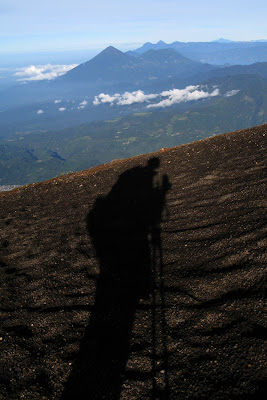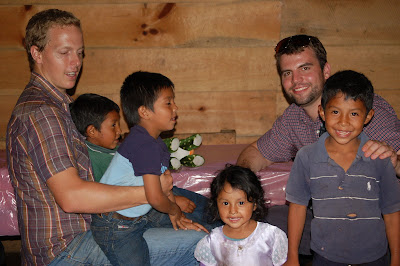Extreme Guatemala

More so than most weeks, this last one was rather insane with its high and low points. Really, that’s been Guatemala for me over the last two years—extreme highs and lows. It’s a maxim that after living in Guatemala for awhile, crazy shit will happen to you, and it has certainly held true for this past week.
I’ll delve into last week later here, but I’ll start with an update of the last month. Most importantly, I finished my second medical mission. We were in the Polochic Valley which is an incredibly poor area. There is one terrible road going out through the valley known for its poor condition and abundance of highway robbers. Throughout the valley there are a handful of towns and villages that have very little access to basic health care and much less, surgery. As such, we had a very good turnout and set another record for number of patients found. The temperature was upwards of 100 degrees during the day and it was a pretty stressful experience, however at the end of the day, we found a ton of patients who will be coming in for surgery. The valley itself is incredibly beautiful. Here's a pic.

After the medical mission, I spent some time in Antigua with a surgical team that was down to operate some of our patients from the rural mission. I then traveled up to Nebaj to work on the December medical mission before coming back to Coban for the beginning of my insane week.
Last Wednesday I was planning to head down to Antigua but got a call that one of our patients from the Polochic had died. It was a total shock, so I decided to drive out into the valley to see what had happened. Her name was Dominga Cuc Botzoc and she had been operated for both a prolapsed uterus and a hernia. What was so crazy was that although she had two major operations, she was one of the fastest patients to recover. She was 77, had 8 children and lived by herself selling tortillas to get by. Coming back from Antigua, she had gone with one of our managers and then got let off to travel the last leg of her trip home. She was apparently fine the first couple days at home, but got an infection that turned for the worse. 8 days after the operation, she passed away.
When I drove out into the Polochic, I kept thinking worst case scenario of how the family was going to be upset and I would end up getting chased out of town by an angry mob. When I came into town, there was a huge group of people around her house and she was laid out on an altar. I went to the wake and spent the day talking with the family about what had happened. Her children did not get along and no one had been able to really take care of her. When her health went bad, she had called our area manager who had tried to get her to the local hospital. However she decided she’d had enough and didn’t go. She said her goodbyes to her children and passed away shortly thereafter.
It was a difficult experience to digest. We helped with the funeral and the family was very supportive of us. However, mostly it was just a very sad situation. The family was upset they hadn’t been around to help out and did not place any blame. For us, it was incredibly frustrating that we couldn’t convince her to get to the hospital. She was a very strong woman and in the end was not interested in letting anyone else control her future. She decided her time had come that the she would decide the hour of her passing.
So, after going through all of that, I decided to take a day off and go hike a volcano. I went down to Antigua and met up with two good friends of mine from Peace Corps. We took off Friday morning and set to climb the Acatenango volcano outside of Antigua. This turned into another extreme Guatemalan experience that held true to the maxim I mentioned before.
For starters, I got food poisoning on Thursday night and by Friday morning I was still throwing up everything I tried to get down. After my terrible week, I was in no mood to sit around in Antigua being sick, so I went anyways. Despite a few yacks in the first leg of the trip, my body started collaborating and realized there were bigger fish to fry—namely my racing heart and need to ingest water as we hauled up the volcano.
Acatenango is a 13,000 foot volcano just outside Antigua right next to the active Fuego Volcano. The hike was brutal. It was straight up for 8 hours and we made it to the crater just as the sun went down. We were the only ones up there and we set up our tent right in the middle of the crater. It was eerily quiet and extremely cold. The only sounds were the occasional gusts of wind and the explosions of the Fuego Volcano. The air was thin and we barely slept.
At dawn, we got up to see the sunrise over Guatemala. Seriously, this was of the most incredible experiences of my life. We could see from Mexico to El Salvador and looked right down onto Fuego Volcano as it smoked. We could see all the other volcanoes of Guatemala and it made the country look tiny. The sun crested right over the crater of the adjacent Agua Volcano—it was euphoric and made the experience completely worth it given what followed on the way down.

After sunrise, we packed up and started down the mountain. We passed some other tourists coming up and kept heading down from the crater. My buddy Bryan was in front of me by about 20 yards and I saw him stopped and talking with some scruffy looking Guatemalans. It didn’t look like a cordial conversation, and when I caught up one of the guys pulled a zip gun out of pocket and told us to have a seat. They went through all our bags and got our phones, camera and money. Thankfully, we convinced them to leave us the memory chip out of Bryan’s camera. They wanted to continue up the mountain to rob the tourists up top and told us we had to come with them so we wouldn’t run down and get the police. We refused and said we’d keep our lips sealed and they let us go. As we hiked down, the robbers came by us again and continued down the mountain. They then robbed some kids from a youth group coming up the mountain and kept going down.
When we caught up with the other group, they told us there were some cops coming up the mountain with a group of Salvadoran tourists. Just as they mentioned that, we started hearing the gunshots. We knew the thieves only had one shot, so we assumed the police did most of the shooting. When it ended we followed down the mountain and met up with the cops. They said they recognized the robbers and just decided to open fire. That’s how it works in Guatemala. The justice system is so ineffectual that the cops prefer to just kill the robbers. However, these cops didn’t shoot so well and just scared the robbers off into the woods. I asked one if he hit anyone and laughing he said, “Oh maybe I hit one, I shot a clip at him so maybe you’ll find some bodies down there.” We thanked them for their efforts and ran down the mountain.
With all that behind me, I’m still glad I went up Acatenango. Living in Guatemala, I can never complain that I get bored.



I’ll be home for Thanksgiving.











































